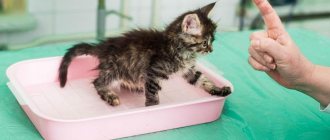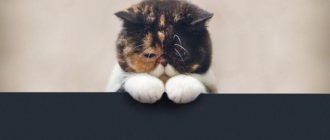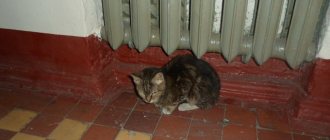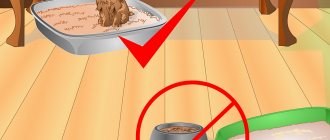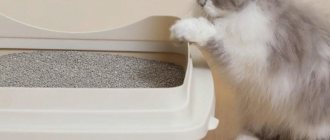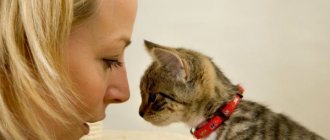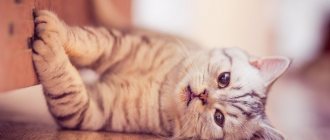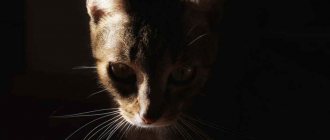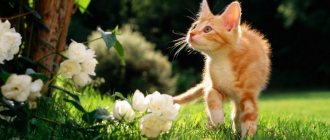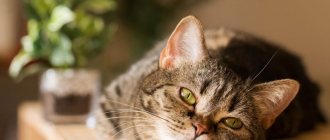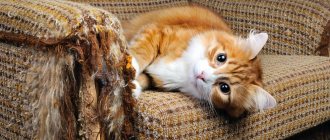Cats' love for flower pots is one of the common problems faced by pet owners. Pets tear up the soil, eat the leaves of indoor plants, or even use flowerpots as a toilet. This not only spoils the appearance of flowers, which owners often care for no less than their pets, but can also be dangerous to the cat’s health - some of them can cause intoxication, poisoning of the body and other health problems. How to stop a cat from climbing into flower pots, and what plants should pet owners avoid?
How to stop a cat from climbing into flower pots?
Why does a cat attack indoor plants?
Pets of all ages experience an irresistible craving for plants, regardless of their gender. If a cat encroaches on your favorite flowers, do not rush to scold her and try to figure out the reason for what is happening.
Desire to eat a flower
Eating leaves and stems of indoor plants indicates a lack of vitamins. Street animals eat grass all the time, so they don’t face this problem. Pets do not have this opportunity, so they often do not receive enough folic acid, calcium, potassium, phosphorus and sodium.
With severe vitamin deficiency, the mustachioed pet begins to eat not only greens, but also the earth. This can lead to diarrhea, vomiting and severe poisoning.
Also, do not forget that any greens are enriched with fiber. This important element is necessary for comfortable digestion and artificial stimulation of vomiting. In addition to trichobezoars (hairballs), the animal can be bothered by worms, gastrointestinal pathologies and infections.
Interested in digging in the ground
Cats love to dig, so they often damage summer cottages during the warm season. Of particular interest are pets with a sedentary lifestyle, often left alone at home. Due to the lack of toys, they have fun as best they can.
The pits that appear are quickly filled with the body of a satisfied mustache. In such a recess he is warm and calm, as he has excellent control of his surroundings. Similar associations are evoked by an ordinary box, which is extremely popular among all representatives of the cat family.
Domestic cats transfer their digging instinct to the soil in which indoor flowers are grown. Many pets are curious to simply dig up the ground - this is a kind of cat leisure.
Perception of a potty as a tray
If your pet relieves itself in a pot, then the problem lies in its upbringing, litter box or illness. This behavior may be explained by:
- rare cleaning of the tray;
- unpleasant odor of the filler;
- young age (the kitten is breastfed and is not yet toilet trained);
- inappropriate location (too noisy and open place) or structure of the tray;
- insufficient number of trays;
- desire to mark territory;
- disease of the genitourinary system or intestines;
- helminthiasis.
When urinating painfully, the animal associates the litter box with unpleasant sensations, so it tries to urinate throughout the house. If you notice this behavior, be sure to contact a veterinary clinic.
Psychological characteristics or problems
Cats may chew leaves to attract their owner's attention or relieve stress. If the pet receives too little attention or has recently experienced a move, then such behavior is completely normal. Try to be close to him to regain his affection and sense of security.
Pay special attention to small children. During games, they often violate the animal's personal space. If a cat's tail is constantly pulled in the toilet or sprayed with water, then he will look for quieter and more reliable places. Rules for handling pets should be laid down from childhood.
Eating soil is not always associated with a lack of nutrients. Sometimes this is explained by pica, a psychological illness that occurs against the background of mental disorder and nervous shock. Eating inedible items can lead to the death of the cat, so this situation should be discussed with a veterinarian.
Most often, animals picked up on the street suffer from pica. In their case, the disorder is explained by long periods of fasting and fear.
How to stop a cat from crapping in the apartment yourself
Use the following simple tips to correct the situation when your cat shits:
- Experienced owners who have raised more than one cat claim that it will never defecate where it eats food. If you find a place where a cat or kitten regularly poops, place a bowl of food there, or scatter food nearby on a piece of paper.
- Some people suggest scaring the animal. As soon as you catch your cat doing something bad, spray him with water from your hand or from a spray bottle. The fear he has experienced will discourage him from crap in this place. You can also knock loudly nearby with a rolled-up newspaper.
- Give the animal more attention. Perhaps the cat is simply bored without you or is experiencing stress from the appearance of a small child or another animal in the house. Your task is to create a feeling of comfort and safety for him, then the cat will not urinate on your carpet and on your things.
It is useless to poke the animal’s nose into its piles or puddles; this will not help wean the cat from a bad habit. Cats do not tolerate violence and instead of the desired effect, you risk getting the opposite result. Your pet may forever lose trust in you and become angry, but he is unlikely to understand his guilt.
Why is a cat's interest in potted plants dangerous?
Your mustachioed pet needs to be discouraged from eating flowers as soon as possible. Otherwise, this can lead to acute intoxication, accompanied by:
- loss of appetite;
- prolonged diarrhea and vomiting;
- severe dehydration of the body;
- damage to mucous membranes;
- general weakness, convulsions and coma.
Similar symptoms are typical when eating poisonous plants and can be fatal. When choosing house flowers, be sure to check their compatibility with the cat family.
Symptoms of vitamin deficiency
Insufficient nutritional components as a result of an unbalanced diet can lead to eating and licking objects that seem unsuitable at first glance. This could be cardboard, tray filler, or your own biological waste.
Why does a cat eat soil from a flower pot? If the planting substrate was purchased in a specialized store, you can safely assume a lack of microelements. After all, fertilizers contain many minerals, such as sodium, potassium, phosphorus, calcium.
Vitamin deficiency can be determined by dull fur or uneven appetite - some animals become gluttons, while others begin to starve. The veterinarian will use tests to determine whether there is a deficiency of minerals and vitamins and prescribe the required treatment.
Premium food contains all the necessary vitamin and mineral complex, selected depending on the age and preferences of the pet. Therefore, veterinarians recommend using special food for the cat family. It is important to choose a quality product - this is guaranteed to eliminate problems with nutritional deficiencies.
Methods for solving the problem
When the cat approaches the pots, say “fu” or “no” while spraying water from a spray bottle. This method is very effective, but takes a lot of time. Cats are less trainable than dogs. It is much easier to eliminate the reason for their increased love for plants or use a trick.
Repelling with an unpleasant odor
Cats have a very sensitive sense of smell, so they are well repelled by strong odors. Protect the soil surface, leaves or pots with:
- table vinegar;
- essential oils of clove, citrus or menthol;
- ethyl alcohol;
- citrus peels;
- any type of pepper.
Renew the scent as soon as it disappears. In addition to the above, you can use special sprays offered in pet stores.
Sharp or rustling objects
Frequent digging of the ground can be prevented by protective nets and gratings. Additionally, decorate the soil with shells or rocks. This will make it more difficult for the flower to spoil.
Cats are afraid of rustling and sticky objects, so cover the area with double-sided tape, foil or cling film. Having fallen into such a trap several times, the pet will quickly lose interest.
For larger plants, any loud objects will do. Decorate your indoor tree with rattles and jars of buttons or cereal. Each encroachment will be accompanied by a loud crash and the rapid escape of the intruder.
Some owners recommend using toothpicks. Despite their effectiveness, they negatively affect the appearance of flower pots and can cause injury to the animal.
Replacing plants with cat grass
Never cut grass near your home. Despite the logic and cheapness, such a solution can lead to serious poisoning. In cities they often fight against rats, so particles of poisons get onto the soil. If you bring such grass home, you can kill your pet.
It is safer to buy sprouted oats through pet stores or grow your own cereal seeds at home. Remember that soil taken from the street may contain helminth eggs, bacteria and fungi. Because of this, it is recommended to use only ready-made substrates or special soil from a pet store.
Moving pots out of reach
If flower pots are placed on the windowsill, they can block the cat's view of the street and also interfere with sunbathing. In this case, it is enough to rearrange them to any other place.
Having confirmed your pet's love for stems and leaves in practice, try hanging a flower pot on the wall. Additionally, the flower garden will have to be separated by a transparent partition to prevent encroachment from the mustachioed prankster.
Change the animal’s diet or introduce vitamins
If a disease or vitamin deficiency is detected, the diet will have to be adjusted. If your pet eats dry food, then try a higher quality analogue. Holistics have the most balanced composition.
If you prefer to use natural products, consult your veterinarian about vitamin and mineral supplements. After including them in your usual diet, the problem should resolve itself.
Worm infestation
Infection of cats with parasitic worms is a fairly common problem.
At risk are stray animals and cats on their own, and small kittens are most susceptible to infection.
The worms living inside feed on the host’s blood and semi-digested food, causing the following symptoms:
- loss of appetite and weight loss;
- lethargy and weak muscle tone;
- disturbances in the digestive tract;
- increase in abdominal volume due to the accumulation of parasites;
- the presence of mucus and blood in the stool;
- problems with the coat;
- lacrimation;
- anemia and pallor of mucous membranes.
Self-cleaning. Feeling discomfort and constant pain in the stomach, the cat strives to cleanse the body of accumulated nastiness. For this purpose, baleen-striped eat sand, soil and grass with hard leaves. All this stimulates the gag reflex and sometimes leads to the removal of live parasites through the mouth. However, in this case, worms are equipped with all kinds of hooks and hooks in the head part, which allow them to be firmly held in the intestinal mucosa, despite strong peristaltic waves.
Diagnosis and treatment. Recognition of the species of the parasite is based on laboratory test data, after which the veterinarian prescribes suitable anthelmintic drugs that paralyze the worms and remove them naturally.
